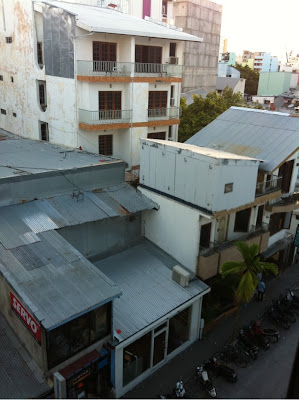Maldives, a
country known for its white sandy beaches, mesmerizing underwater scenery, and
tranquility, consists of 1190 islands spread across an area of 90000 square
kilometers in the Indian Ocean. The island that I live in is the capital city,
Male'; the heart of the country.
Male' is the commercial hotspot of the country accommodating all the main government offices including the president’s office, two hospitals, several schools, higher education colleges, and most of the main retail shops. Unlike other islands the capital lacks a natural beach due to the development of the city. However the beach front is kept very open with not much high rise buildings. An artificial beach has been built there to provide the people with a space for relaxation in the busy city. Almost all roads are narrow and have a width of one car, but with the exception of a few that have combined width of 2-3 cars. They are always congested with traffic, as only few choose walking as a mean of transportation around the city. For a dense city, the capital is well kept in most areas, however some small areas are found to be littered and dirty.
Male' is the commercial hotspot of the country accommodating all the main government offices including the president’s office, two hospitals, several schools, higher education colleges, and most of the main retail shops. Unlike other islands the capital lacks a natural beach due to the development of the city. However the beach front is kept very open with not much high rise buildings. An artificial beach has been built there to provide the people with a space for relaxation in the busy city. Almost all roads are narrow and have a width of one car, but with the exception of a few that have combined width of 2-3 cars. They are always congested with traffic, as only few choose walking as a mean of transportation around the city. For a dense city, the capital is well kept in most areas, however some small areas are found to be littered and dirty.
One of the main roads in Male - Majeedhee magu
One third of
the total population lives in the Male’ making it one the most densely
populated islands in the world. Male’ is approximately 1.97 square kilometers
of land. In my opinion there are several factors that influence the dense
population in the island. Since Maldives is a developing country not all
islands are provided with good health care and good education. This makes
people from the islands to migrate to the capital city where these needs are provided
adequately. Adding to the high population is the number of foreign workers
brought to work in the growing construction industry. It is sad to say that due
to the lack of a correct urban plan, and the vertical and horizontal building limitation,
proper and affordable housing is not provided to everyone in the city. Male’
has become a concrete city, making the people live in a compact housing system.
Due to the compact lifestyle of the people, a lot of social and economical
problems are faced every day.
In addition to the dense
population, environmental threats are on the rise. Some people say that
Maldives will sink in the future years due to global warming. Soil erosion and
pollution has increased and become a concerning matter to the people. There has
been an initiation to reduce the carbon foot print of the country. Also other
environmental projects have been started around the country to find solutions to
the environmental issues. Personally I feel that the construction industry, the
third main industry of country, is one of the main contributors to these
threats. The built up area of the capital takes up most of the land space
giving not enough space for greenery in the city. Since there is not enough
land to have a green space I believe that bringing the green into the built up
area is a good solution to make the city more environmentally friendly. The
sustainable living and eco housing that could be adapted into the housing
system could bring a better living standard and economic
stability to the people.
The artificial beach at the beach front of Male
(picture taken from http://www.pbase.com)
An aerial view of the capital city
(Picture taken from http://www.tnmv.net)











0 comments:
Post a Comment